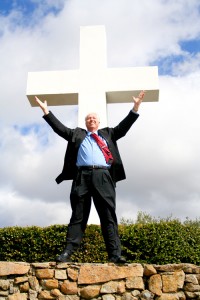 There’s a perception that economics, or the science of economics, is as alien to devout Christians as pagan rituals. The reason for this belief is simple: economics deals with real world concerns, things that impact people in their daily lives.
There’s a perception that economics, or the science of economics, is as alien to devout Christians as pagan rituals. The reason for this belief is simple: economics deals with real world concerns, things that impact people in their daily lives.
Christians further believe that there is no spirituality in economics; that it is, by its very nature, a science that feeds on selfishness and on greed. To the average God-fearing, devout Christian, someone who believes in extending help and assistance to the poor, the needy and the disenfranchised, consumers think only in terms of their personal, selfish needs while entrepreneurs are always voraciously greedy, interested only in additional profits and the accumulation of personal wealth.
Yet, God’s Kingdom is not “other-worldly. It is part of our natural world. As such, Christians who preach “peace and love” should be able to recognize and understand that production and consumption (the pillars of a sound economy) need not be dependent on morality and/or good or evil human motivation.
A more careful and thoughtful study of God’s teachings would help all practicing Christians to understand that He is also concerned with the material aspects of our existence. In other words, economics and its role in human activity matters … a lot.
It’s worth noting, in fact, that God created a material world for all humanity; a world in which one is able to provide material provision for him or herself in winter by working hard in the summer. The truth is that God, as stated in Deuteronomy, indicated that “blessings and curses would be visited upon the people” depending on whether or not they were obedient to Him or disobedient. The connection between economics and Christianity becomes more readily apparent when you understand the rewards for obedience.
As stated in Deuteronomy, those who were obedient would be blessed with many children, with cattle and with copious supplies of food. That is the economic connection. Choose disobedience and you were likely to experience the trauma of curses: barren wombs, small harvests and shrinking herds of cattle and sheep.
Clearly, when you think about the blessings and curses, you can see they are rooted in the material world … they are economic in nature.
Moreover, the connection between Christianity and materialism (economics) can be traced back to the very beginnings of humanity. That is when the first couple, Adam and Eve, were told to “be fruitful and multiply” so as to replenish the earth … to subdue it … and, most importantly, to “have dominion over every living thing that moves upon it.” That thought comes straight from the book of Genesis, is clearly Christian in nature … and reaffirms God’s belief in the material world.
Any true believer in Christianity must, based on those words, accept it as a God-given mandate for filling, working, keeping and ruling creation. In truth, that is precisely what the well-known author, David Hegeman points out in his primer, “Plowing in Hope.”
Hegeman further notes that meeting God’s mandate for the earth requires “wise balance.” His meaning here is quite clear: it is not good to draw too much from “creation” without replenishing the earth. It is equally bad to treat nature as a museum and act as curator, leaving everything in its pristine, natural state by prohibiting development, outlawing all new construction, refusing the erection of new factories and, in so doing … severely damaging economic growth and well-being for people.
So … practicing Christians need to ask themselves this question: how do we fulfill God’s mandate, have dominion over creation … fill the earth with people without creating food shortages, starvation and barbarism?
The question is not moot by any means and, in fact, is one that professional economists struggle with to find an answer. The truth is, in part, that different societies opt for different paths to answer that single question … and the results are generally vastly different.
Economics should be important to all people, Christians included. In order to multiply and grow the population and exercise dominion over the earth, economic progress is essential. That’s reality. Here’s another reality. According to economic theory, there are three sources needed for economic progress. They are: the division of labor … capital accumulation … and entrepreneurship.
The division of labor opens the door wide to increased productivity allowing workers to specialize in specific areas of production (the jobs they do) where they are most efficient. That leads of course, to increased productivity on an individual level which leads, in turn, to greater real income and the development of personal wealth.
However, people are only able to benefit from the division of labor if they are free to exchange the goods they produce. That, of course, requires a political system that allows for personal freedom and an economic system that rewards individual initiative.
Economic progress is also possible by increasing productivity through the use of capital goods. Of course, the capital goods must be produced before they can be used. The road that leads to the accumulation of capital requires that people control personal consumption so that they will have investment capital, when needed, for the production of capital goods.
It’s a simple concept – hold on to your assets – yet it is something that many people tend to overlook. In fact, the more people tend to indulge their current or daily needs and wants, the less likely they are to be able to invest in – and produce – capital goods. The result: less productive labor … and that can impact the economy.
That’s where the third source for economic progress comes up – entrepreneurship. This group of investors is critically important to economic growth and development because they are willing and ready to invest personal capital.
Their capital investment, when done wisely and carefully, leads directly to economic development which benefits the entrepreneur, those with whom he comes into contact with … and the general population, as well.
In order to be successful with their investments, entrepreneurs need to use economic calculation to their advantage. They use knowledge of current market prices to establish meaningful comparisons between different consumer and producer goods and create the goods … and bring them to the marketplace.
 When they do their “prep” work correctly, entrepreneurs reap substantial profits because they are able to provide goods that people (consumers) want the most for the lowest possible price. That’s entrepreneurship at its very best and it leads to economic growth – the happy consequence of a highly-developed division of labor using capital wisely invested for the purpose of profit.
When they do their “prep” work correctly, entrepreneurs reap substantial profits because they are able to provide goods that people (consumers) want the most for the lowest possible price. That’s entrepreneurship at its very best and it leads to economic growth – the happy consequence of a highly-developed division of labor using capital wisely invested for the purpose of profit.
In order for society to benefit from the economic expansion created by the division of labor and the investment of capital, we need social institutions that promote the division of labor … the accumulation of capital … and entrepreneurship.
We need a return to the basic principles that have enabled the United States, from its birth until now, to grow and prosper … to create the most prosperous and successful economic model in the history of the world.
The key to this success – to the positive implementation of the division of labor, the accumulation of capital and entrepreneurship is now, and has always been, the institution of private property.
The truth is that “voluntary exchange” makes the development of the division of labor possible and that can only take place in a society (like ours) that has institutions supporting voluntary trade. As such, the exchanges that create commerce and economic activity require an environment that includes private property. It enables economic development to take place.
The same holds true for Capitalists intent on accumulating wealth (or capital). They, too, need to feel secure in their private property. Case in point: if the state elects to enforce confiscatory taxation, for example, it is certain to hinder and depress capital accumulation because it dramatically reduces net income which leaves the would-be capitalist with less money remaining for savings or for investment. What’s more, the higher taxes also lower incentive that capitalists may have to save and invest.
Finally, peace and private property allow for the division of labor, the accumulation of capital and entrepreneurship – the factors that lead to economic growth and prosperity. Conflict destroys the division of labor and the other factors that lead to economic development whereas peace encourages that activity.
And yet, peace and private property do not guarantee economic growth … they simply make it possible. Again, economic progress requires savings and capital accumulation along with cultural values that have been formed by philosophic and religious beliefs.
Cultures that value consumption – now – tend to stagnate economically. Societies that encourage and believe in thrift generally prosper. In fact, cultural and moral values also affect the way peace and private property are maintained.
Market participants who give in to greed are more likely to seek out state-granted privileges through market regulation, for example, that may reduce the scope of private property. It also increases the chances for fraud and theft and results in resources being drawn away from the production of goods and directed more toward the protection of property.
In God’s words which were delivered to Adam and Eve, it is important to be fruitful and multiply, to subdue the earth and have dominion over every living thing in order to exist civilly without descending into a barbaric struggle for survival. To do those things, it is necessary to establish the social division of labor … to accumulate capital and to engage in entrepreneurship.
These things are possible only when peace exists allowing for the security and use of private property. Peace and the ability to prosper exist, of course, in a democracy. And yet, democracy itself does not guarantee that the proper conditions will exist for economic development and prosperity. It is a political system and not an economic one.
It should be noted, in fact, that in America democracy is not an absolute friend of a free society. Sound strange to you … it is true! That’s because American politicians regularly speak out – and often rule – against the right of private property. The reality is that the United States, through its government, presides over the confiscatory tax system that stifles and often inhibits economic growth and development.
The reality is that, as democracy has expanded throughout our history, our regulatory code has done the same. That code is anti-growth. Therefore, democracy is no guarantee of a successful, unencumbered free market in the United States. There is little reason to believe that it will usher in freedom and economic development elsewhere.
Christians need to know that in order to fulfill the mandate put forth by God the laws of economics must be respected and followed. That will happen only when peace, coupled with private property and the cultural values that sustain both finally allow people to participate more fully in God’s mandate, the one that spoke of economic growth, development and prosperity, but not in those words.
Other articles in this issue:
If you liked this article you may be interested in this product from our sponsor.

 Off The Grid News Better Ideas For Off The Grid Living
Off The Grid News Better Ideas For Off The Grid Living



